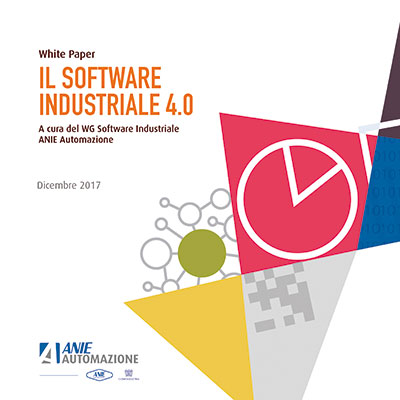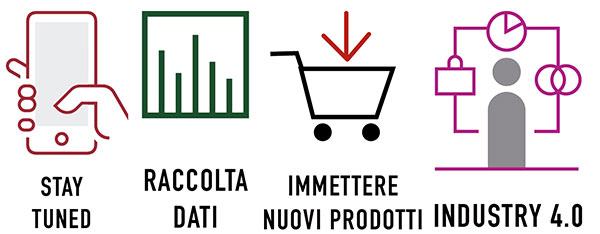Industry 4.0: what industrial software?
Some of the world’s most important ICT and industrial automation suppliers - gathered by Messe Frankfurt Italia Srl to support the next edition of SPS Italia - took part in the round table discussion “Industrial software in the age of 4.0” in Milan last December. The event proved a valuable opportunity for exploring fields of application and the benefits of using advanced software solutions. Maurizio Cacciamani

White Paper “Industrial software 4.0”, authored by ANIE Automoazione’s Industrial Software Working Group.
Moderated by Marco Vecchio (chair of ANIE Automazione), the event involved the participation of 16 speakers and proved a worthwhile endeavor, with a wealth of practical advice for concerns to choose the right industry 4.0 software platform.
• Fabio Massimo Marchetti (Var Sirio Industria), president of WG Software industriale, opened the discussion by highlighting the central importance of industrial software as an important ingredient in Industry 4.0: hence the need for a new working group, made up of ANIE Automazione members operating in the software sector, as well as five major ICT operators, a sector concerned with business processes and a firm’s operational processes. The group set itself 5 goals: to develop guidelines for the implementation of the benefits offered by advanced software solutions; to educate firms about 4.0 topics and the role of industrial software in this field; to develop ROI calculation models for specific fields of application; to familiarize firms with incentives provided by legislation and how to make use of them; and to organize a vertically integrated event dedicated to industrial software.

• Roberto Filipelli explained the concept of investing in industrial software not in order to reduce costs, but above all to enhance market shares. Software is becoming an increasingly intelligent “collaborative object” which the users themselves can take an active role in developing, as long as they avail themselves of multidisciplinary knowledge. The crucial issue is that software personalization is increasingly something for which the user is responsible.
• In 2011, the Wall Street Journal wrote how “software is eating the world”. Matteo Losi (SAP) reminded participants of this tidbit, adding that the prediction was not far off! Increasingly fluid interfaces and constantly improving performance now make it possible to eliminate one’s inventory (also thanks to 3D printing), make plants that are getting smarter all the time, set up predictive maintenance systems, develop collaborative platforms, including at multiple sites and for suppliers or customers. The risk is ending up trapped or constrained by software, which is now able to control everything.

According to Marco Banti (ABB Industrial Automation Division), industrial software suppliers are in a position to create environments that are secure, efficient, transparent and sustainable. The integration of a concern’s internal and external processes is fundamental, making it possible to plan production, control processes, program machines, monitor consumption and manage the supply chain. Where to start? The answer is always bottom-up, by linking up machines, then lines (i.e. operation technology) and finally information technology.
• In his address, Andrea Boccotti (IBM) stressed the close relationship between collecting data in the field, the industrial software that processes that data, and the information generated by the software. A question which all users should ask themselves is how to authenticate information, especially that originating externally, because it carries the risk of contaminating software-generated data.
• Anselmo Strada (Esa Automation) pointed out how every smart device requires software to support it, updating a famous proverb: «Behind every great product is some great software».
• Corrado Giussani (GE Digital), for his part, addressed the importance of software (as long as it is responsive, scalable and cloud-ready) to enhancing productivity. Many firms focus only on production software, whereas it is also necessary to ensure that production data is quickly transferred to logistics and sales systems.
• According to Guido Porro (Dassault Systemes Italia), SMEs represent an immense potential market for industrial software makers (it’s no coincidence that 70% of Dassault’s turnover is from smaller firms). He explained how industrial software is an example of the democratization of technology, with the promising fact that many SMEs are ready to make the leap to innovation. What’s important is that they choose the right platform and plan for complete implementation, not necessarily right away, but over the course of 3-4 years.
• «The biggest problems are in the workshop - stated Stefano Casazza (EPLAN Software & Services) - and their solutions bring exorbitant costs!». While until not so long ago there were vertical softwares for planning mechanical and electrical systems and for programming PLCs, now the modules work in parallel and enable simulating results to avoid potentially disastrous errors. The problem is that people will have to alter their work habits.
• In the view of Marco Fantoni (Cannon Automata), industrial software needs to be flexible and reliable; flexible because it must be able to modify production, even when working with unexpected lots, and enable mass product personalization. In concrete terms, that means adapting to changes in production, managing islands where the products are made, enabling routing of a line to another or even from one site to another, reprogramming machines, especially robots, enabling reprogramming via tablet or smartphone. These are the essential elements that good industrial software should offer.
• According to Simone Marchetti (Oracle), industrial software must offer added value to the concern, which is expected to respond to market demand with extreme promptness in order to meet the needs of consumers, who have in recent years have gained a power that they’ve never had before.
• Francesco Picucci (PcVue) shed light on how mass digitalization requires intuitive, easy-to-use software that is powerful and that can be integrated with a variety of applications. Everyone within the concern must operate in such a way as to standardize information, so that it is easy to manager and interpret.
• According to Attilio Rogora (Cisco), concerns are very much alive to the importance of security but do not dedicate the necessary attention to it in operations. It is necessary to examine internal and external elements vulnerable to attack, analyze security incidents in real-time and isolate compromised areas. As far as concerns collaborative activities, including with external units, cryptographic messaging is best.

• Roberto Motta (Rockwell Automation) also considers security a fundamental, albeit tricky subject. What systems are vulnerable to threats? Definitely machinery and plants. Awareness of this issue among concerns is very high, but knowledge remains lacking.
• «Good thing Minister Calenda has proselytized to the SMEs about Industry 4.0!» exclaimed Daniele Vizziello (Wonderware by Schneider Electric). Following his remarks, he concluded by noting the fact that «without a medium-term plan, concerns risk becoming losers, even if they found success in the short term».
• Roberto Zuffada (Siemens) outlined the future of industrial software, emphasizing how the National Plan for Industry 4.0 unfairly focuses more on production machinery, relegating software to a secondary position (which it does not have in the real world). Software is strategic and should not be looked upon, as many businesspeople do, as a source of costs, but rather as an evolving resource, and thus one on which it is important to keep up to date.
Maurizio Cacciamani
Marcom specialist & technical writer about automation, innovation and packaging

















